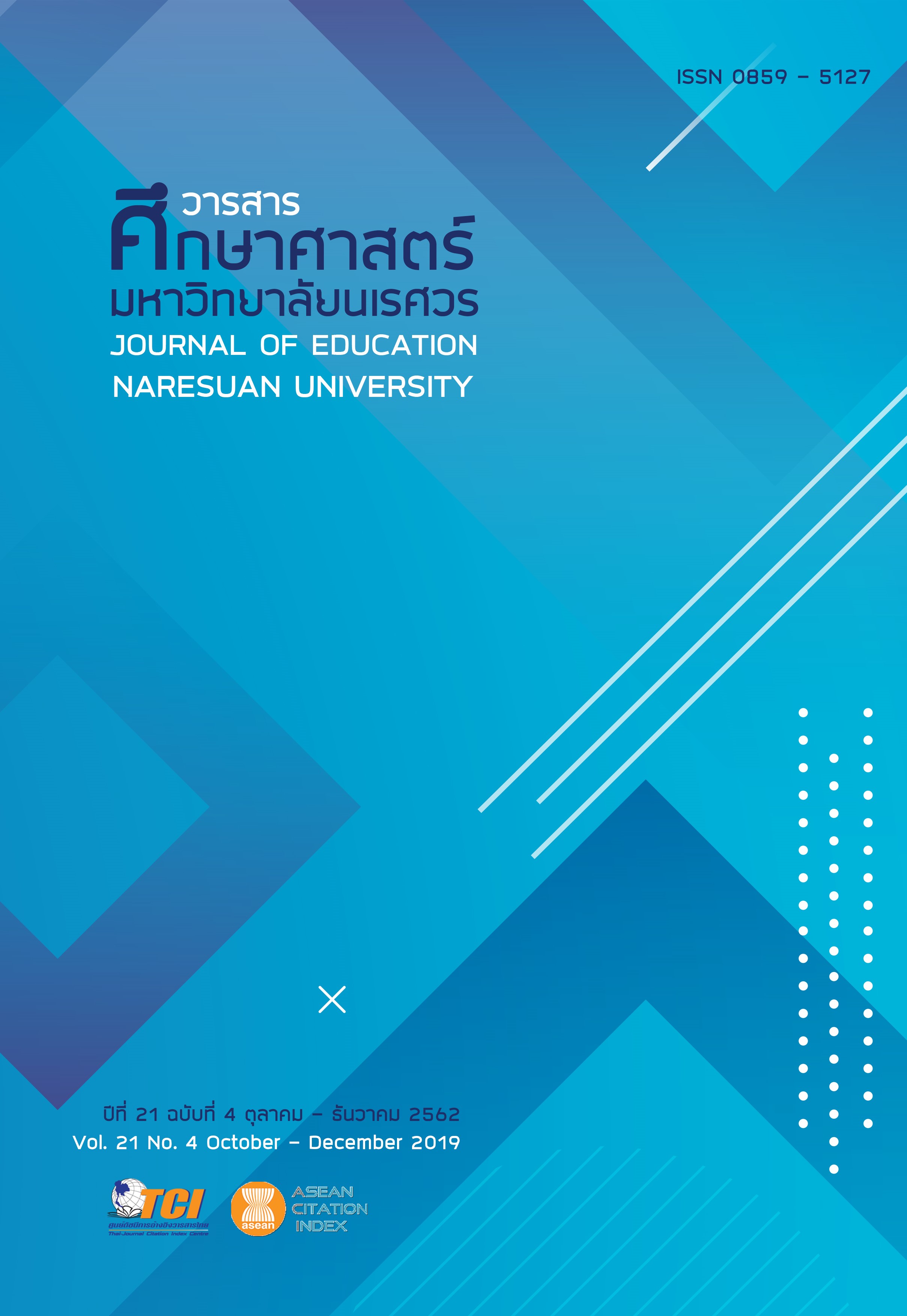การเปรียบเทียบผลสัมฤทธิ์ทางการเรียนและความสามารถในการแก้โจทย์ปัญหาวิชาเคมี เรื่อง ของแข็ง ของเหลว แก๊ส ของนักเรียนชั้นมัธยมศึกษาปีที่ 4 ระหว่างการจัดการเรียนรู้แบบวัฏจักรการเรียนรู้ 5 ขั้น (5E) ร่วมกับกระบวนการแก้ปัญหาของโพลยาและการจัดการเรียนรู้แบบปกติ (A COMPARISON OF LEARNING ACHIEVEMENT AND CHEMISTRY PROBLEM SOLVING SKILLS ON “SOLID LIQUID AND GAS” OF MATTHAYOMSUKSA 4 STUDENTS USING 5E INQUIRY LEARNING CYCLE MODEL WITH POLYA’S PROBLEM SOLVING PROCESS AND CONVENTIONAL LEARNING MANAGEMENT)
Main Article Content
Abstract
การวิจัยครั้งนี้มีวัตถุประสงค์เพื่อเปรียบเทียบผลสัมฤทธิ์ทางการเรียนและความสามารถในการแก้โจทย์ปัญหาวิชาเคมี เรื่อง ของแข็ง ของเหลว แก๊ส ของนักเรียนชั้นมัธยมศึกษาปีที่ 4 ที่ได้รับการจัดการเรียนรู้แบบวัฏจักรการเรียนรู้ 5 ขั้น (5E) ร่วมกับกระบวนการแก้ปัญหาของโพลยา และการจัดการเรียนรู้แบบปกติ กลุ่มตัวอย่างที่ใช้ในการวิจัย ได้แก่ นักเรียนแผนการเรียนวิทยาศาสตร์-คณิตศาสตร์ ชั้นมัธยมศึกษาปีที่ 4 โรงเรียนชำนาญสามัคคีวิทยา ภาคเรียนที่ 2 ปีการศึกษา 2559 จำนวน 2 ห้องเรียน ได้มาโดยการสุ่มแบบหลายขั้น (Multi-stage Random Sampling) แบ่งเป็นกลุ่มทดลอง จำนวน 35 คน ได้รับการจัดการเรียนรู้แบบแบบวัฏจักรการเรียนรู้ 5 ขั้น (5E) ร่วมกับกระบวนการแก้ปัญหาของโพลยา และกลุ่มควบคุม จำนวน 35 คน ได้รับการจัดการเรียนรู้แบบปกติ การวิจัยครั้งนี้เป็นการวิจัยกึ่งทดลอง เก็บรวบรวมข้อมูลโดยใช้แบบทดสอบวัดผลสัมฤทธิ์ทางการเรียนและแบบทดสอบวัดความสามารถในการแก้โจทย์ปัญหาวิชาเคมี เรื่อง ของแข็ง ของเหลว แก๊ส วิเคราะห์ข้อมูลโดยใช้สถิติ ANCOVA (Analysis of Covariance) ผลการวิจัย พบว่า
1. ผลสัมฤทธิ์ทางการเรียนวิชาเคมี เรื่อง ของแข็ง ของเหลว แก๊ส ของนักเรียนกลุ่มทดลองสูงกว่ากลุ่มควบคุม อย่างมีนัยสำคัญทางสถิติที่ระดับ .05
2. ความสามารถในการแก้โจทย์ปัญหาวิชาเคมี เรื่อง ของแข็ง ของเหลว แก๊ส ของนักเรียนกลุ่มทดลองสูงกว่ากลุ่มควบคุม อย่างมีนัยสำคัญทางสถิติที่ระดับ .05
A COMPARISON OF LEARNING ACHIEVEMENT AND CHEMISTRY PROBLEM SOLVING SKILLS ON “SOLID LIQUID AND GAS” OF MATTHAYOMSUKSA 4 STUDENTS USING 5E INQUIRY LEARNING CYCLE MODEL WITH POLYA’S PROBLEM SOLVING PROCESS AND CONVENTIONAL LEARNING MANAGEMENT
The purpose of this research was to compare Matthayomsuksa 4 students’ chemistry learning achievement and chemistry problem solving skills on “Solid Liquid and Gas” using 5E inquiry learning cycle model with Polya's problem solving process and conventional teaching. The samples were selected by using multi-stage random sampling. The participants were Matthayomsuksa 4 students who enrolled in Science-Math program of Chamnansamakkhiwittaya School in the second semester of academic year 2016 that divided in to two there were 35 of experimental group taught by 5E inquiry learning cycle model with Polya's problem solving process and 35 of control group taught by conventional teaching. The design of this research was quasi-experimental design. The data were collected by using chemistry learning achievement test and chemistry problem solving skills test. The data were statistically analyzed by using the ANCOVA (Analysis of Covariance) test. The results of this study indicated that:
1. Chemistry learning achievement on “Solid Liquid and Gas” of the experimental group was significantly higher than the control (p< .05).
2. Chemistry problem solving skills on “Solid Liquid and Gas” of the experimental group was significantly higher than the control (p< .05).
Article Details
The owner of the article does not copy or violate any of its copyright. If any copyright infringement occurs or prosecution, in any case, the Editorial Board is not involved in all the rights to the owner of the article to be performed.
References
2. Department of Curriculum and Instruction Development. (2003). Organizing science subjects in science department. Bangkok: The Teachers’ Council of Thailand. [in Thai]
3. Karplus, R. (1977). Science teaching and the development of reasoning. Journal of Research in Science Teaching, 14(2), 169-175.
4. Khammani, T. (2013). Science of teaching. Bangkok: Chulalongkorn University. [in Thai]
5. Laohaphiburn, P. (1999). Science teaching (3rd ed.). Bangkok: Thaiwatthanaphanich. [in Thai]
6. Lawson, A. E., & Anton, E. (1995). Science teaching and development of thinking. Belmout Califonia: Wadsworth Publishing.
7. Leardphop, W. (2000). A comparison of learning achievement using learning cycle model of
the institute for the promotion of teaching science and technology and the pattern of integration between the learning cycle with the institute for the promotion of teaching science and technology (Master thesis). Bangkok: Srinakharinwirot University. [in Thai]
8. Moonsadaeng, S. (2011). Science seminar. Bangkok: Faculty of education Ramkhamhaeng University. [in Thai]
9. Rhangaptook, W. (1999). Lesson plans of focus on learner-centered (2nd ed.). Bangkok: LT Place. [in Thai]
10. Sujjanan, J. (2011). Lifelong education and community development. Bangkok: Odien Store.
[in Thai]
11. Suphatchaiwong, P., Phaikhamta, C., & Suwanruji, P. (2015). Using model-based learning for enhancing mental model of atomic structure and understandings of the nature of model of 10th grade students. Journal of learning innovation, 1(1), 97-124. [in Thai]
12. Wichianrat, C., Chaiprasert, P., & Srisanyong, S. (2016). A study on the effects of active learning method in hydrocarbon derivatives for grade 12 students. Journal of Education Naresuan University, 18(2), 142-151. [in Thai]
13. The Institute for the Promotion of Teaching Science and Technology. (2013). Assessment of PISA 2012. Bangkok: Aroon Printing. [in Thai]
14. The Institute for the Promotion of Teaching Science and Technology. (2003a). The study of Science-Mathematic. Bangkok: The Institute for the Promotion of Teaching Science and Technology. [in Thai]
15. The Institute for the Promotion of Teaching Science and Technology. (2003b). Organizing science subjects in science department. Bangkok: The Institute for the Promotion of Teaching Science and Technology. [in Thai]
16. The Ministry of Education. (2008). The Basic Education Core Curriculum 2008. Bangkok:
The Teachers’ Council of Thailand. [in Thai]
17. Toomwong, R. (2003). Creating a set of teaching science on topic of the water turtle for Matthayomsuksa 1 students Phothisampan School (Master thesis). Chonburi: Burapha University). [in Thai]
18. Wasthaisong, P. (2001). The results of science learning achievement and problem solving skills of Matthayomsuksa 3 students using Inquiry model with Polya’s problem solving process (Master thesis). Chiangmai: Chiangmai University. [in Thai]
19. Wongratthana, C. (2003). Techniques for using statistics for research (9th ed.). Bangkok: Srinakharinwirot University. [in Thai]


